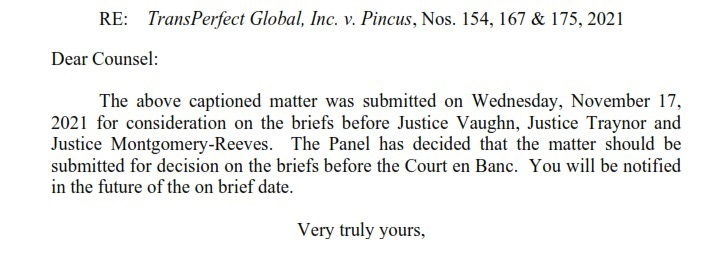A Rare Victory in Delaware is Worth Mentioning
TransPerfect Still Fighting for its Rights in Court
The news cycle has been tight lately, and for obvious reasons. Every newsroom, no matter where it may be, is covering some aspect of Russia’s unprovoked, irrational war on Ukraine. Journalists and newsrooms seek local people who cone either Russia or Ukraine, some economic or social connection, or just to offer understanding to their American readers and viewers about what exactly is happening.
Needless to say, with media personnel being reduced due to competitive ad, commercial, and even subscription rates, and whoever is still employed is covering aspects of Russia’s wanton war or the war on Covid-19, there are many issues that are going unreported now – the dismay of otherwise good commercial enterprises (such as GermPass that I covered last week) and people on the move in society. There is an issue that I have reported on several times already and am still passionate about, and it just received an incredible court ruling at the tail end of last week. TransPerfect Global and its subsidiary in Israel, Milim, had a significant victory in Delaware Supreme Court.
After TransPerfect had been lobbying and litigating obscene legal invoicing by the Delaware Chancery court-appointed custodian and his law firm Skadden Arps, the firm submitted an appeal to Delaware’s Supreme Court on November 17, 2021. The Chancery Court had continually ruled in favor of Skadden and Robert Pincus, the custodian it appointed, and ordered TransPerfect and its CEO Philip R. Shawe to pay millions in legal fees nearly three years after the court-ordered sale and attempted breakup of the company concluded. Skadden still invoices TransPerfect each month for what it considers issues remaining from that sale process, tax matters, ancillary legal matters, and essentially a desire to keep the spigot of unchecked fees pouring in. Skadden and Pincus are regulars on the court-appointed custodian circuit in Delaware and, most recently, the large oil company Citgo also challenged Pincus’ egregious invoicing. A Delaware Federal judge overruled Citgo and awarded Pincus and Skadden here too.
Shawe and the translation company have argued continuously that the fees were egregious and that the custodianship needed to end, and Skadden Arps essentially was billing legal hours for the act of generating bills for legal hours. The then Chancery Court head, Andre Bouchard asked Skadden, “Is it typical? I’m not aware of it happening, … I’m talking about [billing for] the actual generation of an invoice?” Yet, while the Chancery Court urged Skadden to review that practice, it awarded most of their fees and invigorated the position of Skadden to keep the invoices coming.
Shawe and his team challenged that to Delaware’s Supreme Court and it was reviewed by a three-member panel. The court must have a unanimous decision, and it took three months to rule, simply reading the documents without a hearing, and on Thursday, February 24th, the court was unable to reach unanimity. That was the victory. The Delaware Supreme Court rarely has a split. We do not know which just split from the others, and we do not know how each judge decided, but we do know that they were unable to decide whether Shawe’s fee opposition had merit. Instead, the three-judge panel now declared that it must go to the full five members of the court to review, called “Court en Banc”, in Latin.
Upon hearing the split in the court, Shawe said, “We have done nothing but be successful and create thousands of jobs—and for this, we’ve endured nearly 10 years of pillaging at the hands of the Chancery, Skadden Arps, and its other appointees. It’s time for the Delaware Supreme Court to step in, stop unscrupulous Delaware attorneys from benefiting based on their extra-judicial relationships with judges, and finally, put this $50 million dollar frenzy questionable billing to rest.”
Justice Vaughn, Justice Traynor, and the newest member of the court, Justice Montgomery-Reeves, seem to disagree on whether the TransPerfect matter should continue unchecked or whether it should finally be done with, in the First State. When I wrote last, I had thought this was done and the shenanigans within the business court would end. TransPerfect’s lead attorney Martin Russo declared that he was, “[H]appy to see that at least one Justice of the Delaware Supreme Court is giving serious thought to this case, but I am very surprised that given this situation where the justices themselves cannot agree, they wouldn’t want to hear from the parties, or ask questions.”
Ever since this whole matter began in Delaware, the state known for its business-friendly environment has seen competition. TransPerfect itself moved its incorporation status to Nevada, and now, Wyoming is presenting a significant threat to Delaware’s primary revenue source.
Perhaps the rare split in the Supreme Court means that someone there recognizes the dilemma here for businesses to maintain their status in Delaware. An environment where the judges protect their friends in the law firms there and use corporate litigation as a bottomless well to feed one another, regardless of legal integrity or conscience, will not stand.
As we see the economy stumbling as international woes weigh heavy on everyone, nations, states, individuals, and businesses, and the impact of the coronavirus already hitting homes, businesses will choose to limit their losses and liabilities and seek friendlier environments. We should see within 90 days what the full Delaware Supreme Court decides, whether it considers these actions legal and if they believe it serves the best interest of the state.




